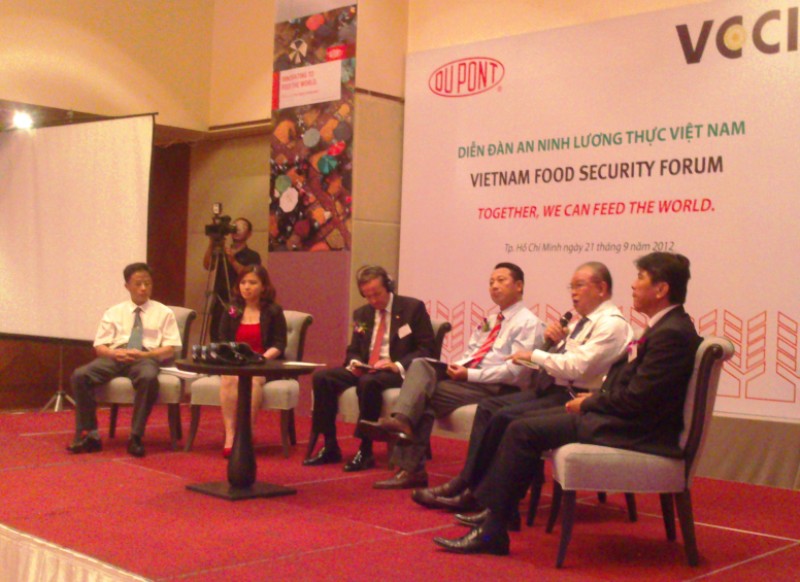Ho Chi Minh City, September 21, 2012 - Food security has been a top concern of all countries. Despite the advantage of being the second largest rice exporter in the world, due to the consequences of the reduction of arable land, depletion of water resources, climate change, urbanization, etc., Vietnam like many other countries around the world are facing a series of challenges in ensuring sufficient and safe food with reasonable prices for people.
With the aim of creating a forum to promote cooperation between policy makers, businessmen, non-governmental actors, experts and farmers in identifying problems and solutions to ensure food security in Vietnam, Vietnam Chamber of Commerce and Industry (VCCI), and Vietnam Business Council for Sustainable Development (VBCSD) in collaboration with DuPont Corporation (United States) organized the food Security Forum. The Forum was held successfully on Friday morning, 09/21/2012 at Sofitel Plaza Hotel, 17 Le Duan, District I, HCM city with the active participation of over 200 delegates from MARD, DARDs, trade associations, research institutes and businesses in Vietnam operating in agriculture and food production.
Opening of the forum, Mr. Doan Duy Khuong, VCCI Vice President cum Co-Chairman of VBCSD listed challenges that Vietnam and also all countries are facing in the problem of food security and emphasized role of coordination between economic actors, government, scientists and the business community.
Mr. James C.Borel, Senior Vice President of DuPont Corporation said that in order to food ensure food security, we should apply science techniques to rice farmers, interesting in the use of water resources for rice. He also said that to meet the challenges of food security worldwide, DuPont has committed to invest USD 10 billion for Research & Development (R & D) in food, agriculture and other fields of nutrition and by the end of 2020 will bring around 4,000 new products; support coaching and training opportunities for young peoples in global, and work with farmers to help improve the lives of people in rural areas.
According to Mr. An T. Le, Consul General of U.S. Consulate General Ho Chi Minh City, Vietnam’s agricultural sector is well positioned to assist with our food security efforts. He applauds Vietnam for taking advantage of its comparative advantage for tropical agricultural production in encouraging Vietnam’s leaders and industry to continue to focus on those natural advantages to enhance agricultural production that is efficient and sustainable. The adoption of agricultural biotechnology is paramount to achieving Vietnam’s potential as a major player in global food security. He said “I am proud that U.S. companies are involved with Vietnam’s growing agricultural sector. When American firms, like DuPont, invest in Vietnam, they don't just bring money and technology, they bring a commitment to building a better future for the people of Vietnam. I cannot think of a better way to improve U.S.-Vietnamese relations than through increased collaboration, exchanges, and technology transfer between our two countries”.
According to Mr Vu Ngoc Tien, Representative Assistant of FAO (Food & Agriculture Organization of the United Nations), although Vietnam’s rice production is more than 7 million tons per year but that is only the volume, the quality is inferior. The human resource in agricultural sector did not have sufficient professional qualifications. Orientation of food export of Vietnam is weak, therefore, the competitiveness in the international market is low. According to Mr.Tien, in the future, Vietnam needs to shift the focus from quantity to quality. The solution, according to Mr. Tien, should be to develop the sector along the value chain, where farmers and state management institutions closely collaborate under appropriate frameworks and orientations that response to the new situation.

Also at the forum, Prof. Dr. Vo Tong Xuan said that the process of industrialization, urbanization, shrinking rice land is leading to the risk of food shortage. In particular, the concern about water for the rice in the Mekong Delta has been raised as Thailand and Lao are expanding the rice area while Cambodia also plans to become a rice exporter. This will further reduce the flow of water in the Mekong River. "Although the Government is determined to maintain 3.8 million hectares of rice fields, but I think it is very difficult, if there won’t be a new thinking about urban and industrial development." – Prof. Xuan said.
Ms.Do Thi Ngoc Diep, Director of HCM Nutrition Center approached this issue in a different direction. According to her, changing eating habits is the most direct and powerful impact to nutrition related diseases. Currently, the rate of overweight and deficiency of micronutrients such as iron, folic acid, iodine, ...in pregnant women is increasing. Accordingly, the disease caused by diet has also increased sharply. Ms. Diep also give some solutions to improving nutrition such as enhancing communication and education on nutrition; researching and developing micronutrient supplements in food; studying nutrient-rich plant and animals; and training of nutrition for staffs, etc.
Mr. Dao Quoc Luan, Deputy Director of Planning Department (Ministry of Agriculture and Rural Development) said: “Although facing major challenges of food security, Vietnam has set the target to end hunger by 2012 by raising the level of food security for groups at risk of food shortage and improving nutritional status, nutritional balance and the meals structure.
Forum ended with a panel discussion chaired by Mr. Nguyen Quang Vinh, Director of the Office for Business Sustainable Development cum General Secretary of the Vietnam Business Council for Sustainable Development. Participants posed a series of questions about the strategic issues, policies, vision and practical problems in life, such as ensuring nutrition for people including children, elderly, and the poor.

